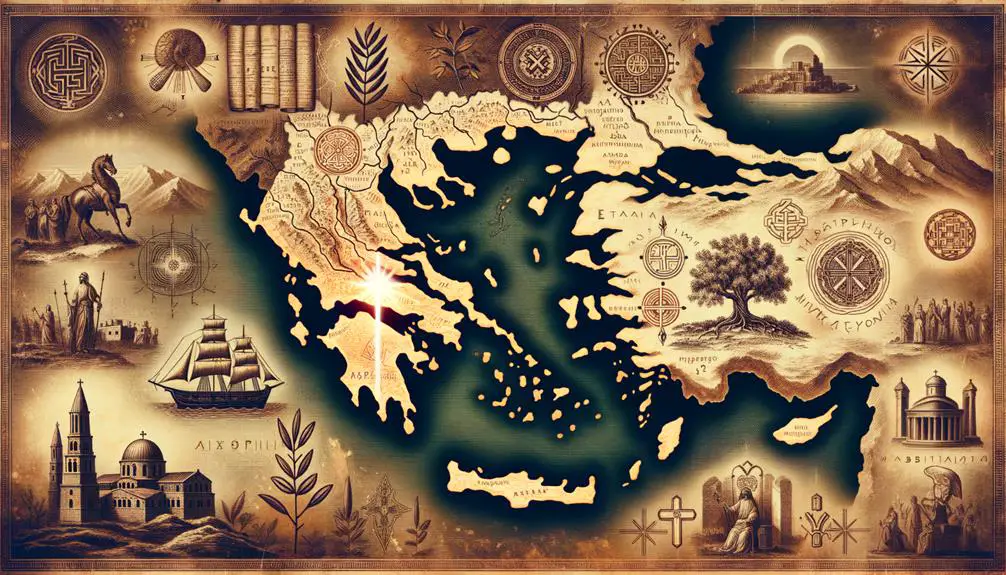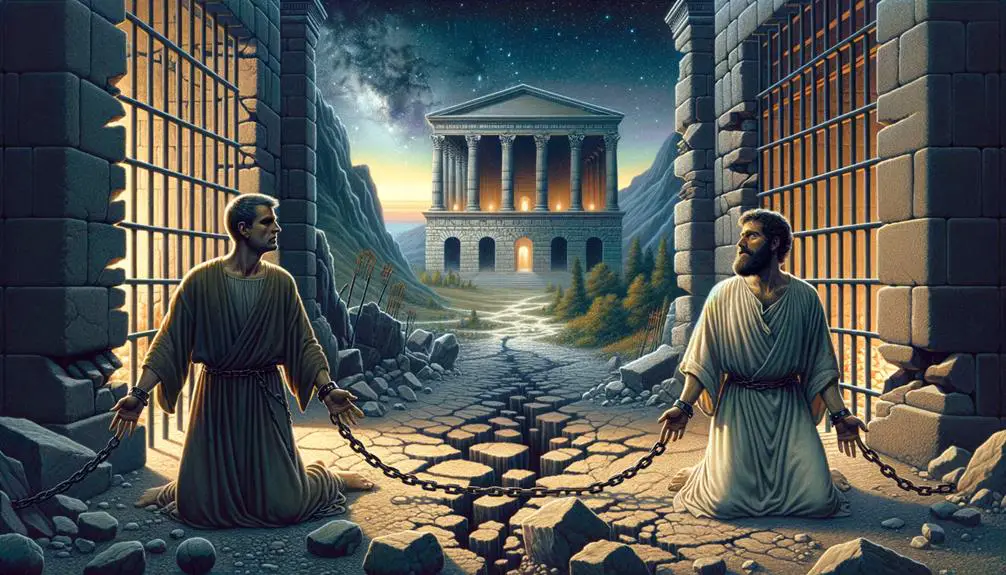Yearn to uncover where Philippi stands in the Bible, a city steeped in history, pivotal to early Christianity's unfolding story?

Where Is Philippi in the Bible
Navigating through the Bible's landscape, you'll stumble upon Philippi, a city cloaked in both spiritual and historical significance. Nestled in the pages of the New Testament, particularly in the Book of Acts and the Epistle to the Philippians, this ancient city serves as a backdrop to pivotal moments in early Christianity.
You'll find it's where Paul's footsteps echoed, leading to the founding of the Philippian church amidst his missionary journey. The layers of its biblical presence, from geographical importance to key events, beckon for a closer look, promising insights into the fabric of early Christian community life and Paul's enduring legacy.
Why does this matter, you might wonder? The answer lies in understanding the profound impact of Philippi's narrative on Christian history and its teachings, a journey that begins with recognizing its place in the sacred text.
Key Takeaways
- Philippi is significant in the Acts of the Apostles, showcasing early Christian evangelism and the conversion of Lydia.
- The city is the recipient of the Epistle to the Philippians, highlighting themes of joy, unity, humility, and perseverance.
- Paul's deep relationship with the Philippians is evident, underlining a mutual spiritual partnership and affection.
- Located strategically on the Via Egnatia, Philippi played a crucial role in the spread of Christianity and blending of cultures.
The Geographic Significance of Philippi

Philippi's strategic location played a pivotal role in both its historical and biblical narratives, serving as a crucial crossroads that significantly influenced the spread of Christianity. As a Roman colony, its position wasn't merely coincidental but a calculated move by the ancient empire to secure and exert influence over the major trade and military routes in the region. This strategic location, nestled on the northeastern coast of Greece and along the vital Via Egnatia, facilitated not only economic prosperity but also cultural and ideological exchanges.
The establishment of Philippi as a Roman colony brought about a unique blend of Roman legal and administrative systems with the local Hellenistic culture, creating a melting pot that was ripe for the dissemination of new ideas, including those of early Christianity. The city's status as a Roman colony meant it was directly connected to Rome, enjoying privileges such as autonomy, a Roman style of governance, and exemption from certain taxes. This made Philippi an attractive destination for traders, veterans, and Roman citizens looking for new opportunities in the provinces.
Moreover, the city's strategic importance was underscored by its role in several key historical events, including battles that shaped the course of Roman history. However, it's the city's connection to the spread of Christianity, a narrative deeply woven into the fabric of its identity as a Roman colony, that stands out. The strategic location of Philippi provided an ideal platform for the early Christian message to be propagated across the Roman Empire, influencing countless generations.
Philippi in the Book of Acts
In the Book of Acts, encountering Philippi marks a significant turning point in the spread of early Christianity throughout the Roman Empire. Here, you'll witness the convergence of pivotal events, among them Silas's role as a steadfast companion to Paul, and Lydia's conversion, marking a crucial expansion of the Christian community to include prominent Gentile members.
Silas's involvement is not merely ancillary; his steadfastness in the face of adversity underscores the resilience and dedication required for the early Christian mission. His unwavering support for Paul during their imprisonment in Philippi exemplifies the profound sense of camaraderie and shared purpose that fueled the Christian movement's growth.
Lydia's conversion, on the other hand, signifies a groundbreaking moment in the Christian narrative. As a well-respected businesswoman dealing in purple cloth, Lydia's acceptance of Christianity and her subsequent baptism, along with her household, highlight the expanding reach and inclusivity of early Christianity. This event not only underlines the movement's appeal across diverse social strata but also emphasizes the role of women in the early Church.
Emotion |
Event |
Impact |
|---|---|---|
Hope |
Lydia's Conversion |
Expansion of Christianity |
Solidarity |
Silas's Role |
Strengthening of the Christian Mission |
Resilience |
Imprisonment |
Perseverance of Faith |
Inclusivity |
Lydia's Baptism |
Diversity of Early Church |
Dedication |
Paul and Silas's Ministry |
Growth of Christian Community |
Analyzing these events through a detailed, scholarly lens reveals the layered complexity of early Christian evangelism. Philippi's narrative serves as a testament to the dynamic interplay of individual faith, communal support, and the overarching providential guidance that propelled Christianity forward.
The Epistle to the Philippians

You must consider the origin of the Epistle to the Philippians, tracing its composition back to Paul's incarceration, which significantly influences its content and tone.
Analyzing the core themes, such as joy, unity, and perseverance, reveals the depth of Paul's theological and pastoral concerns.
Lastly, understanding Paul's relationship with the Philippians offers insight into the mutual affection and support that underscore the epistle's personal and communal messages.
Origin of the Epistle
One must delve into the historical context of early Christianity to understand the origin of the Epistle to the Philippians, penned by the Apostle Paul during his imprisonment. Analyzing the letter's authenticity and the writing context reveals its significance. Scholars scrutinize various aspects to affirm its authenticity, focusing on linguistic style, historical references, and theological consistency with Paul's known teachings. The writing context, amid Paul's captivity, likely in Rome, adds a layer of depth, reflecting his enduring faith and connection with the Philippians.
Aspect |
Description |
Importance |
|---|---|---|
Letter Authenticity |
Affirmed through linguistic and theological analysis |
Ensures integrity of Pauline authorship |
Writing Context |
Penned during Paul's imprisonment |
Reflects Paul's resilience and faith |
Scholarly Consensus |
Broad agreement on the epistle's authenticity |
Strengthens its historical credibility |
Core Themes Explored
Delving into the Epistle to the Philippians reveals core themes centered around joy, unity, humility, and perseverance, reflecting Paul's theological depth and pastoral concern. These elements aren't merely doctrinal positions but are vital for spiritual transformation, deeply influencing the cultural impact of the Christian faith.
- Joy: Despite circumstances, joy emerges as a transcendent state, rooted in faith and fellowship with Christ.
- Unity: Paul underscores the importance of communal harmony, advocating for a collective identity in Christ that surpasses individual differences.
- Humility: Emphasizing Christ's own humility, Paul presents it as foundational for Christian living, promoting selflessness and service.
- Perseverance: Encouraging steadfastness in faith amidst adversity, this theme resonates with spiritual resilience and growth.
These themes collectively forge a pathway towards spiritual maturity, sculpting the believer's character and societal interactions.
Paul's Relationship With Philippians
Building upon these foundational themes of joy, unity, humility, and perseverance, Paul's relationship with the Philippians, as articulated in the Epistle, reflects a profound, mutual affection and a deep spiritual partnership.
Aspect |
Detail |
Impact on Relationship |
|---|---|---|
Paul's Imprisonment |
Highlighted as a testament to his commitment to the Gospel |
Strengthens the bond and mutual respect |
Timothy's Role |
Served as Paul's emissary, ensuring the flow of communication |
Enhances trust and deepens connection |
Mutual Affection |
Evident through Paul's expressions of longing and appreciation |
Solidifies a partnership rooted in faith |
Spiritual Partnership |
Built on shared values and mutual support in times of trial |
Fosters a deep, enduring connection |
This intricate dynamic showcases a relationship not just of mentorship, but of true companionship and spiritual kinship, underpinned by shared trials and a common mission.
Paul's Missionary Journey to Philippi

During his second missionary journey, Paul initiated a pivotal visit to Philippi, marked by its strategic significance in spreading the Christian faith across Europe. This visit, as chronicled in the Acts of the Apostles, wasn't merely a stopover but a calculated move towards evangelizing the Western world. Philippi, a Roman colony, offered a fertile ground for planting the seeds of Christianity's expansion due to its political and economic status within the empire.
In analyzing Paul's mission to Philippi, several critical elements emerge:
- Strategic Choice of Philippi: As a Roman colony, Philippi boasted a blend of Roman legal rights, Greek culture, and a strategic location on the Via Egnatia, making it an ideal hub for the dissemination of the Christian message.
- Lydia's Conversion: Lydia, a seller of purple goods, symbolizes the first European convert, demonstrating the mission's immediate impact. Her conversion, following a divine encounter by the river, underscores the power of personal transformation as a cornerstone of Paul's missionary strategy.
- Cultural and Social Engagement: Engaging with the local populace, Paul navigated the complexities of Roman law and social customs, showcasing adaptability and resilience in his evangelistic efforts.
- Encounter with Roman Authority: The imprisonment and subsequent release of Paul and Silas highlight the challenges and divine interventions marking the missionary journey, further solidifying the faith of the nascent Christian community in Philippi.
This mission to Philippi, intertwined with Lydia's conversion and the city's status as a Roman colony, underscores the multifaceted approach Paul adopted in spreading Christianity. It wasn't just about preaching; it was about engaging with and transforming society from within.
The Founding of the Philippian Church
Following Paul's strategic evangelistic efforts in Philippi, the foundation of the Philippian church marks a significant chapter in the early Christian movement, embodying the successful establishment of Christianity within a Roman colony. This achievement can't be overstated, as it demonstrates the early church's ability to navigate and flourish within the complexities of Roman colonization.
The founding of the Philippian church is notably tied to Lydia's conversion, a pivotal moment that underscores the church's establishment. Lydia, a seller of purple goods, exemplifies the socio-economic diversity within the early Christian community and highlights the role of women in the spread of Christianity. Her conversion, following a meeting by the river where Paul and his companions went to pray, marks the beginning of the Christian faith's inroads into Europe. Lydia's baptism, along with her household, symbolizes the communal aspect of faith and the early Christian practice of household conversions.
This event is crucial for understanding the dynamics of Roman colonization and the spread of Christianity. The acceptance of Christianity by Lydia, a prominent figure in the Philippian society, reflects the early church's ability to cross cultural and socio-economic boundaries. It also sheds light on the strategic approach of Paul and his companions in targeting influential members of society for conversion, which facilitated the rapid spread of Christianity.
The founding of the Philippian church, therefore, isn't just a testament to the resilience and adaptability of the early Christian movement but also a reflection of the socio-political landscape of Roman colonies during the first century.
Key Biblical Events in Philippi

Philippi's biblical narrative is rich with transformative events that mark pivotal moments in the spread of early Christianity. This ancient city, once the stage for the pivotal Battle of Philippi, later became a focal point for the nascent Christian movement. The events that unfolded here were instrumental in the expansion and consolidation of Christianity in the Roman world. As you delve into Philippi's scriptural history, you encounter narratives that aren't just historical footnotes but are foundational to understanding the early Church's development.
- The Battle of Philippi (42 BCE): While not a biblical event per se, the Battle of Philippi set the stage for the city's prominence in Roman history. This conflict, a decisive moment in the Roman Civil Wars, indirectly influenced the spread of Christianity by establishing the political conditions under which the Apostle Paul could later freely travel and preach.
- Lydia's Conversion: Acts 16 recounts the conversion of Lydia, a pivotal moment in Philippi's Christian history. She's considered the first European convert to Christianity, and her baptism symbolizes the breaking of new ground for the Gospel in Europe.
- Paul and Silas in Prison: This event, where an earthquake miraculously frees Paul and Silas, underscores the supernatural affirmation of their mission in Philippi, leading to the conversion of the jailer and his household.
- The Founding of the Philippian Church: Stemming from these events, the establishment of the Philippian Church represents a landmark in Paul's missionary journey, illustrating the fertile ground Philippi offered for the growth of early Christianity.
These events collectively underscore Philippi's critical role in the expansion of Christianity, offering a unique lens through which to view the faith's early development.
Frequently Asked Questions
How Has the Archaeological Study of Ancient Philippi Contributed to Our Understanding of Early Christian Communities?
You've learned a lot about early Christian communities through the archaeological study of ancient Philippi. Excavation methods there have unearthed buildings, inscriptions, and artifacts that illuminate the daily lives and spiritual practices of these early followers.
By preserving these artifacts, experts provide tangible links to the past, revealing the societal structures and religious beliefs that shaped these communities.
This scholarly approach offers a detailed, analytical understanding of early Christianity's development and spread.
What Role Did Philippi Play in the Wider Geopolitical Context of the Roman Empire During the New Testament Period?
In a nutshell, Philippi's role in the Roman Empire's geopolitical landscape during the New Testament era was pivotal. Its battle significance can't be overstated, as it was a crucible for military engagements that shaped Roman power dynamics.
Moreover, its economic impact was profound, acting as a commercial hub due to its strategic location. This combination of military and economic relevance underpinned Philippi's contribution to the Roman Empire's stability and expansion.
Are There Any Non-Biblical Historical Sources That Mention Philippi, and What Do They Tell Us About the City?
Yes, there are non-biblical historical sources that mention Philippi, shedding light on its significance.
The ruins of Philippi reveal a city of considerable importance, with archaeological findings supporting its role in the Roman Empire.
Coinage evidence, notably, provides insight into the economic activities and political status of Philippi, illustrating its wealth and influence.
These sources offer a detailed, scholarly perspective, enriching our understanding of Philippi's historical and cultural context.
How Has the Modern City Near Ancient Philippi Been Influenced by Its Biblical Heritage?
You'll find that the modern city near ancient Philippi has deeply integrated its biblical heritage into its identity. This influence is evident in its economic development and cultural festivals.
The city leverages this rich past to attract tourists, fostering economic growth. Moreover, cultural festivals often celebrate biblical stories and figures, enriching residents' and visitors' understanding of the area's historical significance.
This blend of history and modernity underscores the enduring impact of its biblical connections.
What Are the Main Differences in Religious Practices Between the Original Philippian Church and Contemporary Christian Denominations?
You're diving into the thick of it, comparing apples and oranges, or in this case, ancient Philippian worship with today's Christian denominations.
The main differences? Liturgical variations are vast; think less formality back then, more structured services now.
Communal practices have also evolved; early Christians broke bread in homes, while modern congregations might meet in mega-churches.
It's a scholarly journey, analyzing these shifts, but one that uncovers the rich tapestry of religious evolution.
Conclusion
In your journey through the scriptures, you've traversed the ancient streets of Philippi, a city of profound biblical significance. From the pivotal moments in Acts, where Paul's missionary zeal finds fertile ground, to the heartfelt words of the Epistle to the Philippians, you've witnessed the birth of a church that stands as a testament to faith's enduring power.
Philippi's story is one of transformation and triumph, mirroring the transformative journey of believers then and now. This exploration reveals not just a geographical location, but a spiritual landmark, etching its legacy into the fabric of Christian history.



Sign up